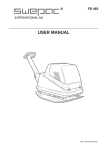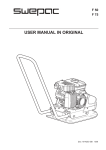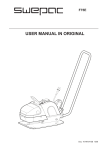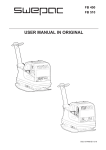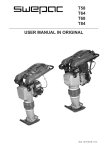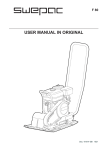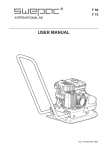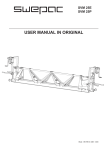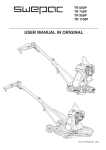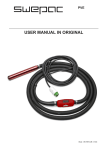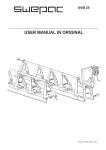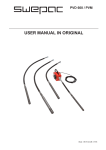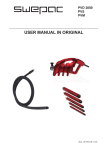Download USER MANUAL IN ORIGINAL
Transcript
FB 165 FB 170 FB 230 FB 250 FB 260 USER MANUAL IN ORIGINAL spac100 Dok: 101497-GB 1310 Dok: 101497-GB 1310 FB165 / FB 170/ FB 230 / FB250 / FB260 2 FB165 / FB 170/ FB 230 / FB250 / FB260 USE SWEPAC FB165 / FB 170 / FB 230 / FB 250 / FB 260 are used to pack ballast under foundations, in connection with road building, in trenches, etc. On account of the forward/reverse function, the machine is very suitable for packing in tight spaces and as a complement to larger packing equipment in places with poor access CONTENTS USE........................................................................... 3 SAFETY INSTRUCTIONS...................................... 4 STANDARDS........................................................... 4 SIGNS....................................................................... 5 TECHNICAL DATA................................................. 6 METHOD OF OPERATION.................................... 6 TECHNICAL DESCRIPTION................................. 7 DAILY CHECKS...................................................... 8 BEFORE STARTING............................................. 10 STARTING, petrol engine...................................... 10 AFTER STARTING................................................ 10 STOPPING............................................................. 10 BEFORE STARTING............................................. 11 STARTING, diesel engine...................................... 11 MANUAL START.................................................. 12 STOPPING............................................................. 12 Dok: 101497-GB 1310 OPERATING INSTRUCTIONS............................ 13 TRANSPORTATION.............................................. 14 EC-DECLARATION OF CONFORMITY.............15 3 FB165 / FB 170/ FB 230 / FB250 / FB260 • Before using the machine, the operator must be informed of the manufacturer’s safety instructions and instructions for use. • The machine may only be used outdoors. • The machine may not be used if protection and safety devices are not present or not working. • The operator may not leave the machine unattended when the engine is on. When the vibrator is connected, the operator must be able to control the movement of the machine using the control handle and the start/stop controls. The machine may be operated only by a trained operator. • During maintenance work or other interventions in the machine, the engine must always be off. • Switch the engine off before adding fuel. Avoid fuel spillage and immediately wipe off any spilled fuel. Add fuel only in well ventilated areas. • Avoid touching hot engine parts, for example the silencer. • Before lifting the machine, check that the lifting device and its mounting are not damaged and that the rubber dampers on the base plate are undamaged and tightened. • During transportation and storage, the fuel tank should be empty and the fuel cock switched off. • When the machine is parked, ensure that it cannot tip over. The machine may not incline more than 20º. • The operator must use ear protectors when working with the machine. • The operator must ensure that no unauthorised persons are in the immediate vicinity of the machine. • Always wear personal protective equipment as heavy, non-slip shoes, ear protectors and approved eye protection. • The machine may not be used in environments with potentionell fire or explosion danger. • Never use the machine if you are tired or have consumed alcohol or are under medication that could affect your vision, your discretion or you coordination ability. • Never use a machine in any way changed from the original design. 4 STANDARDS Noise Measurement in accordance with the standard EN 5004 Rev. 1:1998, Annex C: Measurement uncertainty ± 0.5 dB (A) in 95% of the measurements. In accordance with the conditions in Directive 2000/14/ EC, Annex VI, the following values are reported: FB 170 FB 230 FB 250 FB 260 91 dB (A) 95 dB (A) 95 dB (A) 95 dB (A) 95 dB (A) FB 165 Sound pressure level at the operator’s ears, LpA 108 dB (A) 108 dB (A) 108 dB (A) 108 dB (A) 108 dB (A) Permitted sound power level, L WA Guaranteed 105 dB (A) 108 dB (A) 108 dB (A) 108 dB (A) 108 dB (A) sound power level, L WA As the sound pressure level at the operator’s ears exceeds 80 dB (A), ear protectors must be used during operation! Hand/arm vibrations The vibration acceleration was measured in accordance with the ISO 5349 standard during operation on a surface of macadam. The measurement values were translated into the maximum daily exposure time for regular usage. For additional information about vibrations, please confer the regulation AFS 2005:15 from the Swedish Work Environment Authority, effective July 1st 2005. Measurement uncertainty ± 0.3 m/s2 in 95% of the measurements FB 165 FB 170 FB 230 FB 250 FB 260 Hand/arm 2 vibrations, m/s 2,5 2,5 2,7 2,7 2,7 The maximum daily exposure time 8h 8h 6,9 h 6,9 h 6,9 h Exhaust Emissions The FB165 and FB 230 with petrol engine meet the requirements for exhaust emissions in accordance with EU Directive 2002/88EC stage 2. The FB 170 and FB 250 / FB 260 with diesel engine meet the requirements for exhaust emissions in accordance with 97/68/EC. Dok: 101497-GB 1310 SAFETY INSTRUCTIONS FB165 / FB 170/ FB 230 / FB250 / FB260 SIGNS Warning Signs Machine Signs 1 2 3 9 8 Before use, carefully read the manual and its safety instructions so that you can handle the machine safely. Ensure that the manual is always accessible. Engine and silencer: to avoid burns or discomfort, do not touch hot engine parts when the engine is on or when the machine has recently been used. 4 MACHINERY 5 7 1. 2. 3. 4. 5. 6. 7. 8. 9. 6 Manufacturer Place, country of manufacture. CE mark. Model name. Year of manufacture. Max. engine power. Max. weight. Serial number. Machine type Dok: 101497-GB 1310 Belt drive: Keep hands, tools and other objects away from the belt drive when the machine is on to avoid injury and damage. See the safety instructions in the manual. As the sound pressure level at the operator’s ears exceeds 80 dB (A), ear protectors must be used when working with the machine to prevent hearing damage. 5 FB165 / FB 170/ FB 230 / FB250 / FB260 TECHNICAL DATA FB 165 Net weight..................................160 kg Base plate, w x l.........................450 / 550 x 720 mm Speed . .......................................approximately 25 m/min Permitted inclination . ...............20° Centrifugal force........................32.000 N Vibration frequency...................82 Hz Drive engine...............................Honda GX 200 Engine power.............................4,9 kW Engine RPM . ............................3250 RPM Fuel tank volume........................3.6 liter Fuel type.....................................Unleaded petrol, 95-98 octane FB 170 Net weight..................................163 kg Base plate, w x l.........................550 / 450 x 720 mm Speed . .......................................approximately 25 m/min Permitted inclination . ...............20° Centrifugal force........................32.000 N Vibration frequency...................82 Hz Drive engine...............................Hatz 1B20 Engine power.............................3,1 kW Engine RPM . ............................3250 RPM Fuel tank volume........................3 liter Fuel type.....................................Diesel MK1 Net weight..................................240 kg METHOD OF OPERATION Base plate, w x l.........................550 x 790 mm Speed . .......................................approximately 25 m/min The machine consists of a base plate with a vibration Permitted inclination . ...............20° element and an upper part cushioned from the base Centrifugal force........................40.000 N plate. The cushioning between the base plate and Vibration frequency...................79 Hz the upper part consists of rubber dampers. The Drive engine...............................Honda GX 270 power is transmitted from the engine to the vibration Engine power.............................6.0 kW element via a V-belt which can be adjusted with a Engine RPM . ............................3200 RPM belt tensioner. The engine V-belt pulley is fitted with Fuel tank volume........................6 liter an integrated centrifugal clutch, which allows the Fuel type.....................................Unleaded petrol, engine to be started and run idle without the vibrator 95-98 octane FB 250 being connected. The engine is well protected against Net weight..................................265 kg damage in connection with use and transportation by Base plate, w x l.........................550 x 790 mm a sturdy protective frame with a protective panel. Speed..........................................approximately 25 m/min Permitted inclination..................20º FUEL and OIL RECOMMENDATIONS Centrifugal force........................40.000 N Vibration frequency...................79 Hz Fuel FB165 / FB230..........Unleaded petrol 95-98 octane Drive engine...............................Yanmar L70N Fuel FB170 / FB 250 / FB260.........................Diesel Engine power.............................4.5 kW Engine oil..............................SAE 10W-30 Engine RPM . ............................3200 RPM Engine oil change petrol engine: first oil change after 20 Fuel tank volume........................3.5 liter hours then every 100 hours of operation. Fuel type.....................................Diesel MK1 Oil quantity, crankcase FB165.......................0,5 liter Battery........................................12V 40Ah FB230..........................1 liter Engine oil change diesel engine: first oil change after 50 FB 250 hours then every 200 hours of operation. Net weight..................................265 kg Oil quantity, crankcase FB170........................1 liter Base plate, w x l.........................550 x 790 mm FB250........................1 liter Speed..........................................approximately FB260........................1 liter 25 m/min Permitted inclination..................20º Hydraulic oil...............................HydraWayBIO PA 22 Centrifugal force........................40.000 N Quantity FB165 / FB170....................1,65 liter Vibration frequency...................79 Hz FB230..................................1,65 liter Drive engine...............................HATZ 1B30 FB250 / FB170....................1,65 liter Engine power.............................4.8 kW Engine RPM...............................3200 RPM Oil type/quantity, vibration unit.......SAE10W-30 Fuel tank volume........................3.5 liter FB165 / FB170....................0,30 liter Fuel type.....................................Diesel MK1 FB230 / FB250 / FB260......0,35 liter Battery........................................12V 40Ah 6 Dok: 101497-GB 1310 FB 230 FB165 / FB 170/ FB 230 / FB250 / FB260 TECHNICAL DESCRIPTION FB 165 / FB 230 1 2 12 3 4 5 11 spac100b 10 9 Control handle Forward/reverse control Lifting eye Centrifugal clutch V-belt Vibration element Base plate Rubber damper Engine plate Petrol engine Transport locking device Throttle lever 1. 2. 3. 4. 5. 6. 7. 8. 9. 10. 11. 12. Control handle Forward/reverse control Lifting eye Centrifugal clutch V-belt Vibration element Base plate Rubber damper Engine plate Diesel engine Transport locking device Throttle lever 6 7 8 1. 2. 3. 4. 5. 6. 7. 8. 9. 10. 11. 12. FB 170 / FB 250 / FB 260 1 2 12 3 4 5 11 9 8 7 6 Dok: 101497-GB 1310 10 7 FB165 / FB 170/ FB 230 / FB250 / FB260 DAILY CHECKS Fuel Check Check that there is fuel in the tank. Top up if necessary. Air Filter Check The air filter must be checked at least once every working week. When working in dusty conditions, check daily. Engine Oil Level Check Check the oil level in the crankcase every day. The oil must reach the edge of the filling hole when the machine is on a level surface. Honda 1 1. Paper element 2 2. Foam plastic element Oil/Fuel Leakage Check every day that the engine is not leaking oil or fuel. If a leak is discovered, the machine may not be operated until the fault has been remedied. Yanmar 1 2 HATZ spac102 Cleaning 1.Remove the foam plastic element and the paper element and check that they are undamaged. Replace damaged parts. 3. Strike the paper element against a hard object a few times to loosen any dirt. 8 Dok: 101497-GB 1310 2. Wash the foam plastic element in liquid with a high flashpoint and let it dry properly. Dip in engine oil and squeeze dry. FB165 / FB 170/ FB 230 / FB250 / FB260 V-belt Drive Check the tension and condition of the V-belt regularly. Replace a damaged V-belt with the new type according to the table below Machine type FB165 FB170 V-belt type XPA 907 XPA 907 FB230 FB250 FB260 XPA 932 XPA 932 XPA 907 Hydraulic Oil Level Check Check every day that the hydraulic connections do not leak or wear during operation. Check the oil level with the dipstick on the top of the tank. The level must be between “MIN” and “MAX”. Fill up when required. Rubber Dampers Check the condition of the rubber dampers regularly. Replace damaged dampers. Dok: 101497-GB 1310 spac101 9 FB165 / FB 170/ FB 230 / FB250 / FB260 spac103 Oil level On Closed Fuel cock Open Choke spac107 Throttle lever BEFORE STARTING AFTER STARTING See Daily Checks on page 8. Switch the throttle lever to idle. STARTING – Petrol Engine, FB 165 / FB 230 Open the choke gradually. Switch the engine power switch to “1”. Open the fuel cock. STOPPING Switch the throttle lever to “MIN”. Adjust the choke. If the engine is cold, close the choke completely. Do not use the choke if the engine is warm or if the air temperature is high. Start by pulling the starting handle. Pull it first until the mechanism engages. Then pull it hard and fast. 10 Run the engine warm for around 5 minutes. Switch the engine to idle and let it run for a few minutes. Switch the engine power switch to “0”. Close the fuel cock. Dok: 101497-GB 1310 Off Engine power switch FB165 / FB 170/ FB 230 / FB250 / FB260 Closed Open spac104 spac108 Charging lamp and engine start switch Fuel cock spac105 spac107 Throttle lever Hatz 1B30 charging lamp and engine start switch(key) BEFORE STARTING FB 250 Yanmar See Daily Checks on page 8. Note! Never run the starter motor for longer than 10 seconds at a time. If the engine does not start, wait 15 seconds before trying to start it again. Open the fuel cock. Switch the engine power switch to “1”. Switch the engine to the idle position idle. Push the start button. STARTING – FB 250 HATZ (Electrical Starter) Dok: 101497-GB 1310 Switch the throttle lever to “MIN”. A whistle signal is heard when the key is turned to the ignition position. Indicator light for battery charging lights up. Push in the key and turn it. The key springs back after starting. 11 FB165 / FB 170/ FB 230 / FB250 / FB260 spac104 spac105 spac107 Throttle lever Charging lamp and engine start switch Charging lamp and engine start switch(key) spac106 Decompression handle Manual start Handstart HATZ STOPPING Turn the key to the ignition position (apply to 1B30). Pull the starter cord as far as it will go. Let the cord go back in. Switch the engine to the idle position idle, let it run for a few minutes, then switch it to stop. Handstart Yanmar Never switch the engine off with the decompression handle. Switch the engine power switch to “0”. Close the fuel cock. HATZ Turn the key. A whistlesignal is heard if the key is in the ignition position. Dok: 101497-GB 1310 Press the decompression handle down. The handle must remain in the depressed position. Switch the engine power switch to “1”. Take hold of the starter cord with both hands and pull hard. In very cold weather or if the battery capacity is low for a different reason, starting can be facilitated using the decompression device in connection with the valve housing. Press the lever down and hold it down until the flywheel has reached its maximum RPM. Then let it go. Yanmar 12 FB165 / FB 170/ FB 230 / FB250 / FB260 OPERATING INSTRUCTIONS The machine’s vibration elements start when the throttle is increased. The best packing is achieved at full engine RPM. Avoid running the engine at other RPM. The machine’s vibration element stops when the throttle lever is switched to stop. NOTE! When moving up a slope, the machine should be reversed. The machine may not incline more than 20º when in use or parked. To move forwards, do not touch the forward/reverse control. To reverse, pull the hoop towards the control handle. Reversing Moving forwards spac110a spac110b Dok: 101497-GB 1310 The machine is only designed to be used outdoors. Work with the machine in daylight or other adequate lighting. Ballast must be wetted or naturally damp. All other use is discouraged. 13 FB165 / FB 170/ FB 230 / FB250 / FB260 Handle heater FB 250 has a heated handle for increased comfort. Push the button (1) to activate the heated handle. TRANSPORTATION The machine has a lifting eye that can be used for a hook or hawser. 1 spac109 Polyuretan Pad A polyuretan pad is used for stone paving work to protect against stones and ground clinker Check before lifting that the lifting eye and its mounting on the machine are undamaged. Check also that the base plate’s rubber dampers are undamaged and firmly attached. For transportation by vehicle, the handle must be folded forwards and locked with the transport locking device. The machine must then be secured with, for example, approved straps. Note! Secure it by the base plate and not the rubber-cushioned upper part. Secure the machine with straps accorrding to illustration during transportation Note! Secure it by the base plate and not the rubbercushioned upper part. 14 Dok: 101497-GB 1310 Transport locking FB165 / FB 170/ FB 230 / FB250 / FB260 EC-declaration of conformity Manufacturer Swepac AB Blockvägen 3 34132 Ljungby 1. Category: Vibratory plate 2. Type: FB165 FB170 FB230 FB250 FB260 3. Engine power: FB165.......................4,9kW FB170.......................3,1kW FB230.......................6,0kW FB250.......................4,5kW FB260.......................4,8kW The product complies with the following directives: 2006 / 42 / EG 2000 / 14 /EG 2004 / 108 / EG EN 500-1 EN 500-4 Dok: 101497-GB 1310 Technical documentation held by: Swepac AB, Blockvägen 3 SE-34132 Ljungby Tomas Johansson / Product Engineer 15 SWEPAC AB Address Blockvägen 3, 341 32 Ljungby, Sweden, tel. +46 (0)372-156 00, fax +46 (0)372-837 41, E-mail [email protected], Internet www.swepac.se


















